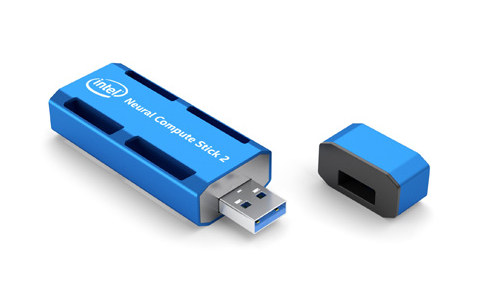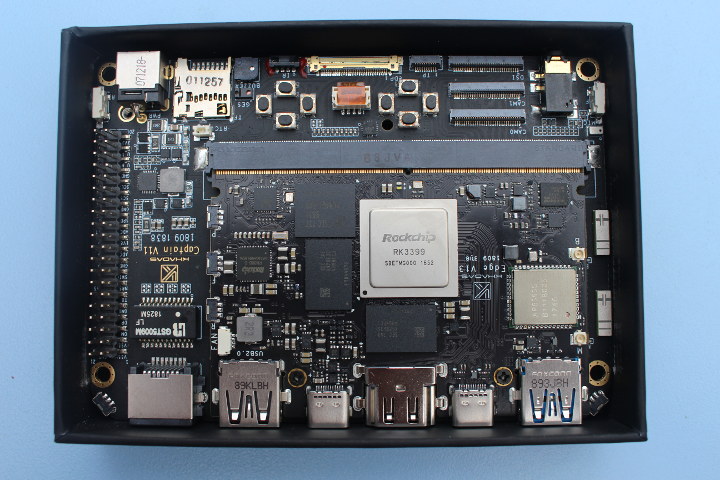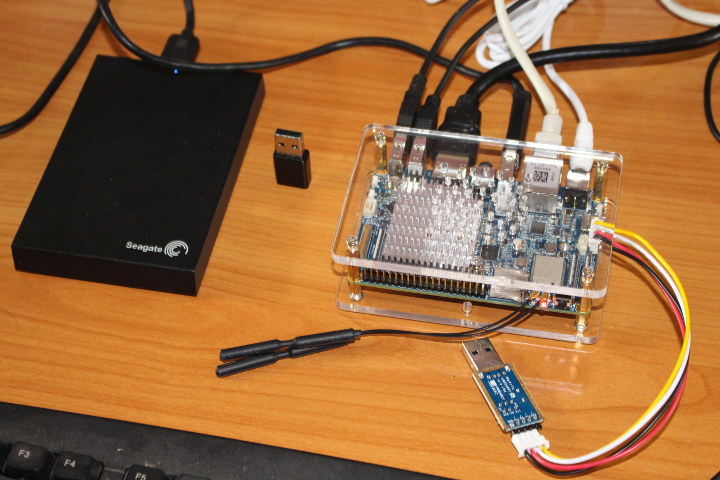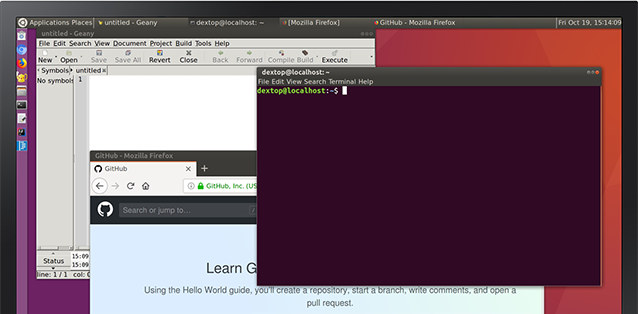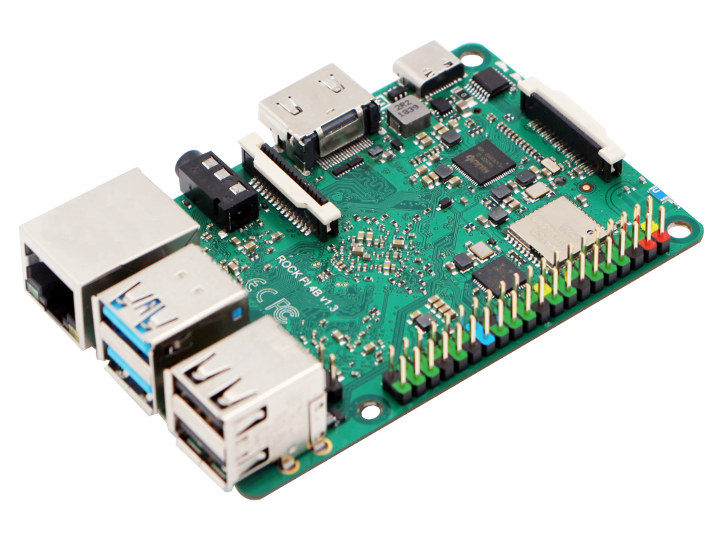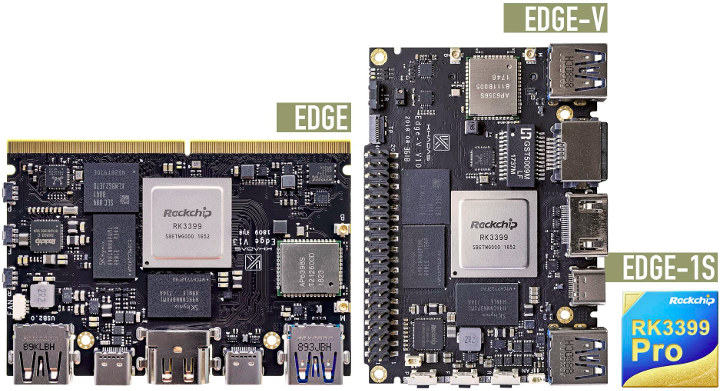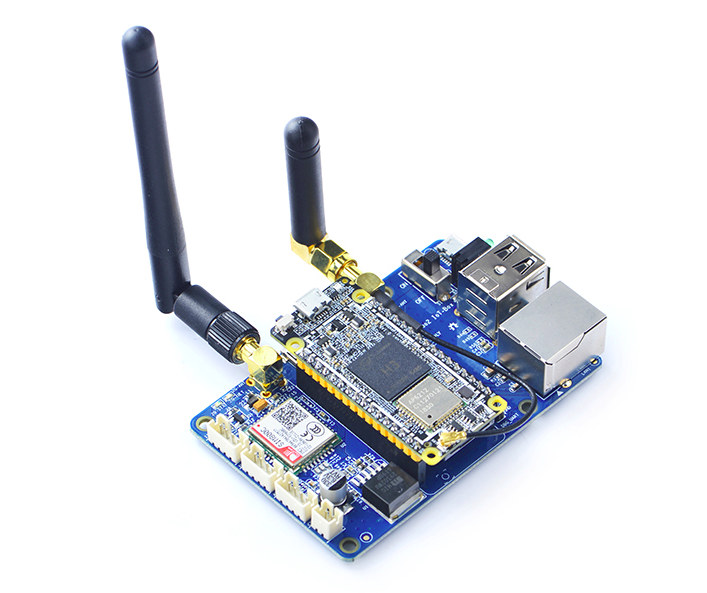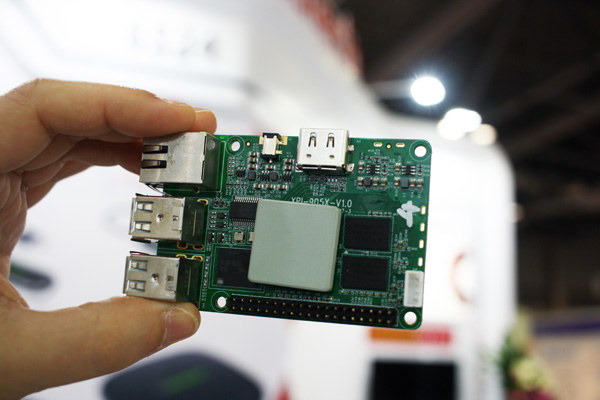Intel Neural Compute Stick was first introduced in early 2017 as a USB compute that allows AI inference at the edge with low power consumption. The stick is based on Myriad Movidius 2 VPU (Vision Processing Unit), and was found to significantly improve inference performance on Raspberry Pi 3 board over a proprietary GPU accelerated solution. However, a little later last year, Intel also announced Movidius Myriad X VPU with claims of up to 10 times DNN performance over Myriad 2 VPU. But so far, we would only see solutions launched with the latter, and it looks like Intel is finally ready to bring Myriad X VPU to the market with the company announcing Intel Neural Compute Stick 2 at Intel’s artificial intelligence (AI) developer conference in Beijing taking place on November 14 and 15. Intel NCS 2 (Neural Compute Stick 2) specifications: Processor – Intel Movidius Myriad X Vision Processing […]
Khadas Edge Developer Package Review – Part 1: Unboxing, Captain and Edge-IO Expansion Boards
Shenzhen Wesion recently launched an Indiegogo campaign for their Rockchip RK3399/RK3399Pro based Khadas Edge, Edge-1S and Captain boards. The Edge boards have an interesting form factor as they are both standalone boards, and system-on-modules compatible with Captain carrier board, and the smaller Edge-IO board. While the crowdfunding campaign is on-going, the company decided to send me an early version of Khadas Edge Developer Package for evaluation. I’ll start out by checking out the content of the kit, and show how to get started with assembly, before reviewing the board with Linux at a later date. Khadas Edge Developer Package Unboxing I received the developer kit in a blank carton board package, but they’ll likely have a prettier package at launch like they did for heir VIM2 board. Anyway, the important part is the content. From top left to bottom right: An IR remote control, the package for the Edge board […]
Giveaway Week – NanoPC-T4 RK3399 SBC
We started the week-end with a Rockchip RK3399 board, so it makes perfect sense to end giveaway week with a bang, and another RK3399 SBC: FriendlyElec NanoPC-T4. Like other such boards, NanoPC-T4 supports both Linux and Android, but since I had tested various RK3399 SBCs with Linux, instead I decided to review NanoPC-T4 with Android 7.1, and it performed mostly has expected although I found out a larger heatsink would be necessary for more consistent performance. FriendyElec normally provides good documentation and decent firmware images for their boards so that definitely a plus. The winner of the kit will receive half of what is shown in the photo above, as I received two kits with the board, a heatsink and screws, a remote control, a 12V power supply, and an acrylic case. To enter the draw simply leave a comment below. Other rules are as follows: Only one entry per […]
Linux on DeX (Linux on Samsung Android Phones & Tablets) Enters Private Beta
Samsung unveiled “Linux on Galaxy” a little over a year ago with the aim of allowing developers to running Linux desktop on their high Galaxy smartphones coupled with DeX Station dock, keyboard, mouse and display. It was not quite ready for public consumption yet, so I registered to their mailing list to get more information in due time. This morning, I received an email with the subject “Register for the Linux on DeX beta trail” that reads in part: As an early adopter, you signed up for Linux on Galaxy at the Samsung Developer Conference (SDC) 2017. This service allows you to project a Linux development environment onto a desktop environment, complete with a monitor, keyboard, and mouse. So you can bring your code with you, wherever you go. This year, we have renamed the service Linux on DeX, and are beginning a private beta trial. Please visit our booth […]
Rock Pi 4 Raspberry Pi Compatible RK3399 Board to Sell for $39 and Up
The long awaited RPi 4 is almost finally here! Except we’re not talking about Raspberry Pi 4, but Rock Pi 4 designed by Radxa team, back after three years following the launch of Radxa Rock 2 Square, with the new SBC just unveiled by Tom Cubie, Radxa founder. Rock Pi 4 single board computer is powered by a Rockchip RK3399 hexa-core processor coupled with 1 to 4GB RAM, and following Raspberry Pi 3 and ASUS Tinker board form factor. There will be two variants with Rock Pi 4 Model A and Model B sharing most of the same specifications: SoC – Rockchip RK3399 big.LITTLE hexa-core processor with 2x Arm Cortex-A72 @ up to 1.8 GHz, 4x Cortex-A53 @ up to 1.4 GHz, a Mali-T864 GPU with support OpenGL ES1.1/2.0/3.0/3.1, OpenVG1.1, OpenCL, DX11, and AFBC, and a VPU with 4K VP9 and 4K 10-bit H265/H264 decoding System Memory – 1, 2 […]
Khadas Edge RK3399/RK3399Pro Board Crowdfunding Campaign Launched
Khadas Edge is another upcoming Rockchip RK3399 board that we initially covered this summer, and comes with a particular design in the sense it is both a single board computer with USB and Ethernet port, and a system-on-module through its edge connector. Later on we found out, the company was working on a variant called Khadas Edge-V with the edge connector being replaced by a more standard 40-pin header, as well as Khadas Edge1S powered by Rockchip RK3399Pro for AI applications. The company has now launched the three boards and accessories through an Indiegogo crowdfunding campaign. I’ve already covered the two RK3399 boards in previous post, and the RK3399Pro based Khadas Edge-1S (2GB RAM, 2x MIPI-CSI, …) will be similar to Edge board but with , so instead I’ll have a closer look at the specifications for Khadas Captain carrier board for Khadas Edge / Edge-1S: Edge connector – 314-pin […]
Tiny NanoPi Duo2 Board Comes with WiFi, a Camera Interface, an Optional 2G-IoT Dock
NanoPi Duo was launched last year as an ultra-cheap ($8+) Arm Linux board that fits into a breadboard. The board was powered by Allwinner H2+ processor coupled with 256 or 512MB RAM, and the infamous XR819 802.11b/g/n WiFi chip. FriendlyElec has now launched NanoPi Duo2, that’s still breadboard compatible, but with a slightly longer form factor, Allwinner H3 processor, 512 MB RAM, better WiFi thanks to an AP6212 module, and an extra camera interface. As we’ll see further below the company also developed a carrier board for 2G cellular IoT applications. NanoPi Duo2 specifications with highlights in bold showing differences again NanoPi Duo: SoC – Allwinner H3 quad core Cortex A7 processor @ 1.2 GHz with Mali-400MP2 GPU System Memory – 512 MB DDR3 SDRAM Storage – micro SD card slot, footprint for SPI flash Connectivity – 802.11 b/g/n WiFi + Bluetooth 4.0 LE (Ampak AP6212 module) with chip antenna, […]
Geniatech XPI-S905X Board Leverages Raspberry Pi 3 Form Factor
Geniatech is well known in the media player industry for their Amlogic based TV boxes, but in recent years, they’ve also launched some development board from other silicon vendors such as Qualcomm with Developer Board IV and Developer Board 8 powered by respectively Snapdragon 410E and 820E. The company has now launched the XPI family of single board computers that will allow closely follow Raspberry Pi 3 form factor while offering better performance and features. Geniatech will start with XPI-S905X board powered by an Amlogic S905X quad core Cortex A53 processor @ 1.5 GHz with 4K HDR video playback and output capability. Geniatech XPI-S905X board preliminary specifications: SoC – Amlogic S905X quad core ARM Cortex-A53 processor @ up to 1.5 GHz (but they claim 1.6 to 2.0 GHz max…) with penta core ARM Mali-450MP GPU, and Amlogic Video Engine 10 System Memory – 1GB or 2GB (default) DDR3 RAM Storage […]


